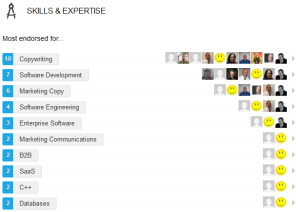Late in 2012, LinkedIn created a new way to recommend people in your network: the LinkedIn Endorsement.
The way I first found out about endorsements was by the back door. People to whom I was connected started to give me these new fangled endorsements – for software development, copywriting, marketing, etc.
And I started to see this new area on my profile:
What the heck, I thought profoundly.
I then started to receive popups in LinkedIn like the one below that invited me to give other people endorsements.

Typical LinkedIn Endorsement Nag Screen
A colleague, Matt Heusser, has written an interesting post about endorsements that reflects some of the opinions I hold.
Endorsements are criticized by some as being “cheap” or trivial. I have given plenty of endorsements, both spontaneously to friends, as well as to those who have endorsed me. Only in a small minority of cases have I given endorsements that reflect work experiences, just as I have only received a very few endorsements that reflect actual on the job experiences.
Where Do LinkedIn Endorsements Fit In?
My observation of the way that people in real life use endorsements indicates the following facts:
- LinkedIn constantly encourages users (via popups) to give LinkedIn endorsements to anyone and everyone to whom we’re connected.
- Endorsements are often given as a goodwill token, not necessarily leveraged by direct observation of our work quality.
- We tend to give endorsements to those who endorse us.
Do Endorsements Replace LinkedIn Recommendations?
No. Absolutely not.
LinkedIn Recommendations are (basically) short letters of recommendation, or testimonials. Recommendations are short essays that you create that endorse, in words, the work of those with whom you have worked or done business.
Recommendations can be time consuming to create. And some users may (wrongly) believe that an endorsement can replace a recommendation.
Recommendations have their own issues – a quality recommendation can be time consuming to write and the recipient has to approve the recommendation in order to render it visible. An endorsement is “cheap and cheerful” and is easy to give or receive with no complexities.
Endorsements are especially cheapened by their over-use. That’s reason enough to write a real LinkedIn recommendation for someone who has proven their talents and merit to you on the job.
In short, recommendations and endorsements are two different animals. They seem to be similar but they are used by real people in entirely different ways.
LinkedIn Endorsements are Mostly Social
Here is my view:
Endorsements are an extended “Like” feature. Period. Regardless of the original intent, endorsements are used by most people as a glorified “Like”.
This means that you really need to write a Recommendation if you want to “bless” a connection with a professional seal of approval that indicates actual on-the-job experiences with their work.
In short, LinkedIn is getting on the social media bandwagon by providing a new way for users to indicate their friendship with their connections in a novel way.
If you like the fact that your friend and connection Joe Smith is trying his hand at insurance sales, you can endorse him with any or all of ten different related phrases that pop up when you type in the word “insurance”.
But if you have purchased insurance from Joe Smith or you work with Joe Smith at an insurance agency, and you want to help Joe out with his new career, write Joe Smith a recommendation in addition to (or instead of) the easy-to-grant endorsement that you’d give others out of a sense of goodwill.
Are Endorsements Weak or a Defective Concept?
Lots of endorsements often means that you have lots of friends. Some of the endorsements will have substance – many won’t.
Having friends who will vote for your talents is a good thing.
In my view, nobody in their right mind would use endorsements as a hiring standard for the represented skills. There is only one exception I can see: lots of endorsements will indicate great people skills and/or lots of prominence.
I see no negative to endorsements. I know someone who was deeply concerned because only his wife endorsed him on LinkedIn. There is a way around this: give lots of (sincere, job related) endorsements to your connections, and some will return the favor.
Lots of endorsements indicate just one thing in my view: that you have lots of LinkedIn connections who know, trust and like you, who want to see you succeed, and who are “voting” their view that they hope or believe that you probably do good work in the areas they are endorsing.
Conclusion
Given the way that real people use them, LinkedIn endorsements are more social than professional.
Use and collect endorsements with a clear conscience. You should write real recommendations – the text kind that the subject has to accept and approve – when someone does good work for you.
Endorsements don’t mean a lot by themselves, but they are an interesting decoration for anyone’s LinkedIn profile. They indicate that you have peers who believe in you.


